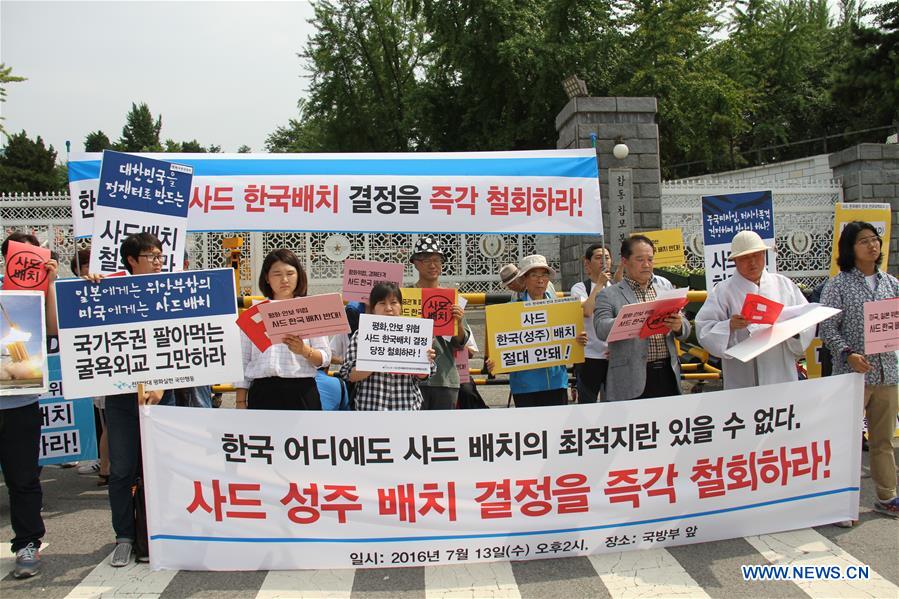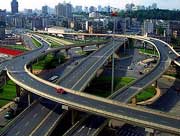


People attend a rally to protest against deploying the U.S. missile defense system, called Terminal High Altitude Area Defense (THAAD), in front of the defense ministry in Seoul,South Korea, July 13, 2016. South Korea's defense ministry on Wednesday announced an agreement with theUnited Statesto deploy the U.S. missile defense system, called Terminal High Altitude Area Defense (THAAD), to its southeastern region despite continued opposition from neighboring countries. (Xinhua/Wang Jiahui)
PYONGYANG, July 30 -- After Seoul and Washington decided in early July to introduce the Terminal High Altitude Air Defense, or THAAD, onto the Korean Peninsula, the Democratic People's Republic of Korea (DPRK) immediately voiced strong condemnation and even threatened to take "physical countermeasures" to deal with the missile system.
Pyongyang has in response emphasized that the introduction of the anti-missile shield would only exacerbate tension in the region, encourage a new round of arms race and even provoke another Cold War. Official media outlets have reported extensively protests and opposition within South Korea.
The DPRK's National Peace Committee of Korea said that fierce opposition and large-scale protests in South Korea were "an eruption of hatred and resentment" toward Seoul's decision to host the THAAD system.
"Owing to the Park group's foolish decision to deploy THAAD, South Korea is now being reduced to a U.S. outpost for aggression and a hotbed of a nuclear war," the committee said in a statement criticizing South Korean President Park Geun-hye and her government regarding the missile interceptor.
The Committee for the Peaceful Reunification of the DPRK, a committee in charge of handling inter-Korean relations, even bluntly called Park "a traitor," blaming her for selling off interests of the whole Korean nation and harming regional peace and stability by making the decision on THAAD deployment.
The committee accused Park of catering to the U.S. demand and offering the Korean Peninsula to foreign forces by agreeing to deploy the anti-missile shield.
The state-run news agency KCNA earlier slammed Park's decision on THAAD in a commentary, claiming that deploying the battery in South Korea gives Washington an excuse to maintain its military presence on the peninsula, which has existed for more than seven decades, and will further the split of the Korean nation.
The KCNA also rebuffed South Korea's assertion that THAAD is simply of defensive nature, stressing that "with no rhetoric can it cover up its aggressive nature as a harasser of global peace and stability."
The Korean Central News Agency called the THAAD deployment "a risky military move that may bring a new Cold War to Asia Pacific," saying that it aimed to "upset regional strategic balance and contain China and Russia by force directly."
"It is the U.S. ulterior purpose to neutralize the attack capability of rapidly developing Asian countries, specifically the regional powers, through its missile shield and thus hold political, economic and military hegemony in the region," it said.
The state media also expressed concerns that the move may spark an arms race, create a military bloc, and spark a new Cold War in the Asia Pacific.
Rodong Sinmun, the most influential newspaper in the DPRK, rebuked Seoul's claim that THAAD does not target any third country and only serves to protect the country from the North's missile and nuclear threat, saying that the rhetoric was "sheer sophism."
The party newspaper said that behind the deployment of THAAD to South Korea was the U.S. aim to "hold supremacy in Northeast Asia and contain countries around the Korean Peninsula with a military edge," and that judgement is broadly shared around the world.
Minju Joson, an official newspaper with the DPRK's cabinet, held the opinion that the Park government made such a rush decision to introduce the anti-missile shield in order to find a way to tide over its severe ruling crisis by hyping up threats from the North and confrontation between the two sides of the Korean peninsula.
Meanwhile, the THAAD deployment will be of no help at all in addressing the denuclearization issue of the Korean Peninsula. In the wake of the THAAD decision, Pyongyang has repeatedly stressed that the DPRK will further bolster nuclear deterrence in quality and quantity and will "do everything it can to defend its sovereignty and dignity."
Deploying THAAD in South Korea makes the already intense situation on the Korean Peninsula even more complicated and more unpredictable.
But one thing is sure: this move, as said by the DPRK official media, renders South Korea itself a primary attack target and all South Korean cannot but fall victim to the South's dangerous act.
Day|Week

 Who Will Fit The Chinese Roles In Game Of Thrones?
Who Will Fit The Chinese Roles In Game Of Thrones? China's Hubei Shennongjia added to World Heritage List
China's Hubei Shennongjia added to World Heritage List Cute Dog At Fruit Stand Becomes Latest Internet Sensation
Cute Dog At Fruit Stand Becomes Latest Internet Sensation Thai most beautiful transgender Nong Poy release new photos
Thai most beautiful transgender Nong Poy release new photos Top 10 livable Chinese cities
Top 10 livable Chinese cities The last primitive tribe in China
The last primitive tribe in China China's first intelligent security robot debuts in Chongqing
China's first intelligent security robot debuts in Chongqing A Total of 3,552 Subscribers Vanish In Two Days; YouTube Closes All Doors to Users’ Inquiries
A Total of 3,552 Subscribers Vanish In Two Days; YouTube Closes All Doors to Users’ Inquiries Out of this world! Futuristic UFO-shaped yacht has its own garden and a stunning underwater viewing deck
Out of this world! Futuristic UFO-shaped yacht has its own garden and a stunning underwater viewing deck An old tea house in Chengdu
An old tea house in Chengdu